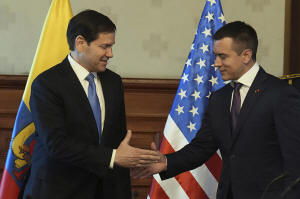US designates 2 more gangs in Latin America as foreign terrorist groups
[September 05, 2025]
By MATTHEW LEE, REGINA GARCIA CANO and JACQUELYN MARTIN
QUITO, Ecuador (AP) — The United States is designating two Ecuadorian
gangs as foreign terrorist organizations, marking the Trump
administration’s latest step to target criminal cartels in Latin
America.
U.S. Secretary of State Marco Rubio made the announcement Thursday while
in Ecuador as part of a trip to Latin America overshadowed by an
American military strike against a similarly designated gang,
Venezuela's Tren de Aragua. That attack has raised concerns in the
region about what may follow as President Donald Trump's government
pledges to step up military activity to combat drug trafficking and
illegal migration.
“This time, we’re not just going to hunt for drug dealers in the little
fast boats and say, ‘Let’s try to arrest them,’” Rubio told reporters in
Quito, Ecuador’s capital. “No, the president has said he wants to wage
war on these groups because they’ve been waging war on us for 30 years
and no one has responded.”
The Defense Department said late Thursday that two Venezuelan military
aircraft flew near a U.S. Navy vessel in international waters, calling
it “a highly provocative move” and warning President Nicolás Maduro’s
government against further actions.
Two more gangs are designated as terrorist groups
Los Lobos and Los Choneros are Ecuadorian gangs blamed for much of the
violence that began during the COVID-19 pandemic. The terrorist
designation, Rubio said, brings “all sorts of options” for Washington to
work in conjunction with the government of Ecuador to crack down on
these groups.
That includes the ability to kill them as well as take action against
the properties and banking accounts in the U.S. of the group’s members
and those with ties to the criminal organizations, Rubio said. He said
the label also would help with intelligence sharing.

Los Choneros, Los Lobos and other similar groups are involved in
contract killings, extortion operations and the movement and sale of
drugs. Authorities have blamed them for the increased violence in the
country as they fight over drug-trafficking routes to the Pacific and
control of territory, including within prisons, where hundreds of
inmates have been killed since 2021.
US strike in the Caribbean takes center stage
The strike has become the focus on Rubio's trip, which included a stop
in Mexico on Wednesday.
U.S. officials say the vessel's cargo was intended for the U.S. and that
the strike killed 11 people, but they have yet to explain how the
military determined that those aboard were Tren de Aragua members.
Rubio said U.S. actions targeting cartels were being directed more
toward Venezuela, and not Mexico.
“There’s no need to do that in many cases with friendly governments,
because the friendly governments are going to help us,” Rubio told
reporters. “They may do it themselves, and we’ll help them do it.”
A day earlier, Rubio justified the strike by saying the boat posed an
“immediate threat” to the U.S. and Trump opted to “blow it up” rather
than follow what had been standard procedure to stop and board, arrest
the crew and seize any contraband on board.
[to top of second column]
|

U.S. Secretary of State Marco Rubio and Ecuador's President Daniel
Noboa shake hands at the presidential palace in Quito, Ecuador,
Thursday, Sep. 4, 2025. (AP Photo/Jacquelyn Martin, pool)

The strike drew a mixed reaction from leaders around Latin America,
where the U.S. history of military intervention and gunboat
diplomacy is still fresh. Many, like officials in Mexico, were
careful not to outright condemn the attack. They stressed the
importance of protecting national sovereignty and warned that
expanded U.S. military involvement might backfire.
Ecuador has struggled with drug trafficking
President Daniel Noboa thanked Rubio for the U.S. efforts to
“actually eliminate any terrorist threat.” Before their meeting,
Rubio said on social media that the U.S. and Ecuador are “aligned as
key partners on ending illegal immigration and combatting
transnational crime and terrorism."
The latest U.N. World Drug Report says various countries in South
America, including Colombia, Ecuador and Peru, reported larger
cocaine seizures in 2022 than in 2021. The report does not give
Venezuela the outsize role that the White House has in recent
months.
“I don’t care what the U.N. says. I don’t care,” Rubio said.
Violence has skyrocketed in Ecuador since the pandemic. Drug
traffickers expanded operations and took advantage of the nation’s
banana industry. Ecuador is the world’s largest exporter of the
fruit, and traffickers find maritime shipping containers filled with
it to be the perfect vehicle to smuggle their contraband.
Cartels from Mexico, Colombia and the Balkans have settled in
Ecuador because it uses the U.S. dollar and has weak laws and
institutions, along with a network of long-established gangs,
including Los Choneros and Los Lobos, that are eager for work.
Ecuador gained prominence in the global cocaine trade after
political changes in Colombia last decade. Coca bush fields in
Colombia have been moving closer to the border with Ecuador due to
the breakup of criminal groups after the 2016 demobilization of the
rebel group Revolutionary Armed Forces of Colombia, better known by
its Spanish acronym FARC.
Ecuador in July extradited to the U.S. the leader of Los Choneros,
José Adolfo Macías Villamar. He escaped from an Ecuadorian prison
last year and was recaptured in June, two months after being
indicted in New York on charges he imported thousands of pounds of
cocaine into the U.S.
___
Lee and Garcia Cano reported from Mexico City. Associated Press
writer Adriana Gomez Licon in Fort Lauderdale, Florida, contributed
to this report.
All contents © copyright 2025 Associated Press. All rights reserved
 |